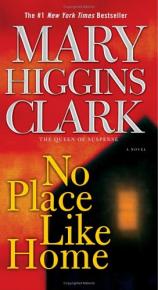No Place Like Home
Review
No Place Like Home
Celia Nolan and her "four-year-old son, Jack [thought they were
going] to see a horse show in Peapack, an upscale town in northern
New Jersey, when suddenly Alex [Nolan, her husband of six months]
detoured to Mendham, a neighboring town. It was only then that he
told [her] he had a wonderful surprise for [her thirty-fourth]
birthday and drove down the road." He parked in front of a house he
said was hers as he handed her the deed. "I cannot believe I am
standing in the exact spot where I was standing when I killed my
mother."
Thus begins chapter one of NO PLACE LIKE HOME by Mary Higgins
Clark. Needless to say, Celia is speechless and hopes she is having
a nightmare, rather than living one. When Alex takes Jack to
explore the house, Celia is left with Mr. Paley, who is filling in
for his boss, Georgette Grove, the realtor who sold the house to
Alex. He is telling the shocked new homeowner about how Alex got to
the house and "apparently fell in love with it immediately. The
house is quite simply an architectural treasure, and it's situated
on ten acres in the premier location in a premier town."
Celia is still struck dumb as she thinks: "I know it is a treasure.
My father was the architect who restored a crumbling
eighteenth-century mansion, turning it into this charming and
spacious home." She feels as though she is free falling in time
back to the night her mother died.
"Ted pinning Mother against the wall …
"Mother sobbing …
"I am pointing the gun at him. Daddy's gun …
"Let go of my mother …
"Sure …
"Ted spinning Mother around and shoving her at me …
"Mother's terrified eyes looking at me …
"The gun going off …
"Lizzie Borden had an axe …"
Her name had been Liza Barton but she quickly became "Liza Borden"
and the house earned the appellation "LITTLE LIZZIE'S PLACE.
BEWARE!"
Although the tragedy happened twenty-five years ago, and Celia was
acquitted, she was an orphan, a ward of the state who spent time in
a juvenile shelter. "Martin and Kathleen Kellogg of Santa Barbara,
California, were the distant cousins who adopted [her]. At the time
of [her] Mother's death, they had been living in Saudi Arabia where
he was with an engineering firm. They did not learn anything about
what had happened until the company relocated them back to Santa
Barbara. Childless themselves, they learned of what had happened,
then, quietly and without a hint of publicity, came to Morris
County and petitioned to adopt [her]. They were genuinely
compassionate. Liza went with them willingly." They changed her
name to Celia Kellogg, and for seven years she lived as normal a
life as she could under the protection of her adoptive
parents.
She came east to attend college and opened a design studio in
Manhattan after graduation. She was very successful in her work and
very much in love with her first husband with whom she had Jack.
Celia had made a promise to him on his deathbed --- not to tell a
soul about her background. Thus, Alex Nolan, her new spouse, has no
idea about what returning to "the scene of the crime" is going to
do to his wife, their son, their marriage, and the community. As
the body count starts to rise and long-buried secrets emerge from
the darkness of the past, Celia is not only the prime suspect in
the killings but she and her son become targets of the killer as
well.
In her Acknowledgements Clark tells her readers, "Last year, my
friend … who is a real estate agent, asked me if I knew about
a New Jersey law that states that a real estate agent must inform a
prospective buyer if the home he or she is considering carries a
stigma that might cause psychological damage to the purchaser.
Maybe there's a book in it for you," suggested the woman. That law
was the genesis of this current novel.
Mary Higgins Clark is known for her tightly woven narratives,
interesting characters, and the intricate twists in the storyline.
But unfortunately, even with its great premise, NO PLACE LIKE HOME
falls far short of her usually fast-paced, challenging novels. Once
readers understand the introduction to the plot they don't have to
use too many "little gray cells" to guess how events will unfold.
Submerged in banality and predictability, the plot is tedious and
holds none of the suspense Clark has built her reputation upon.
Readers can only hope that Clark has another book in the offing
that will, like so many of her other novels, be a
page-turner.
Reviewed by Barbara Lipkien Gershenbaum on January 13, 2011





